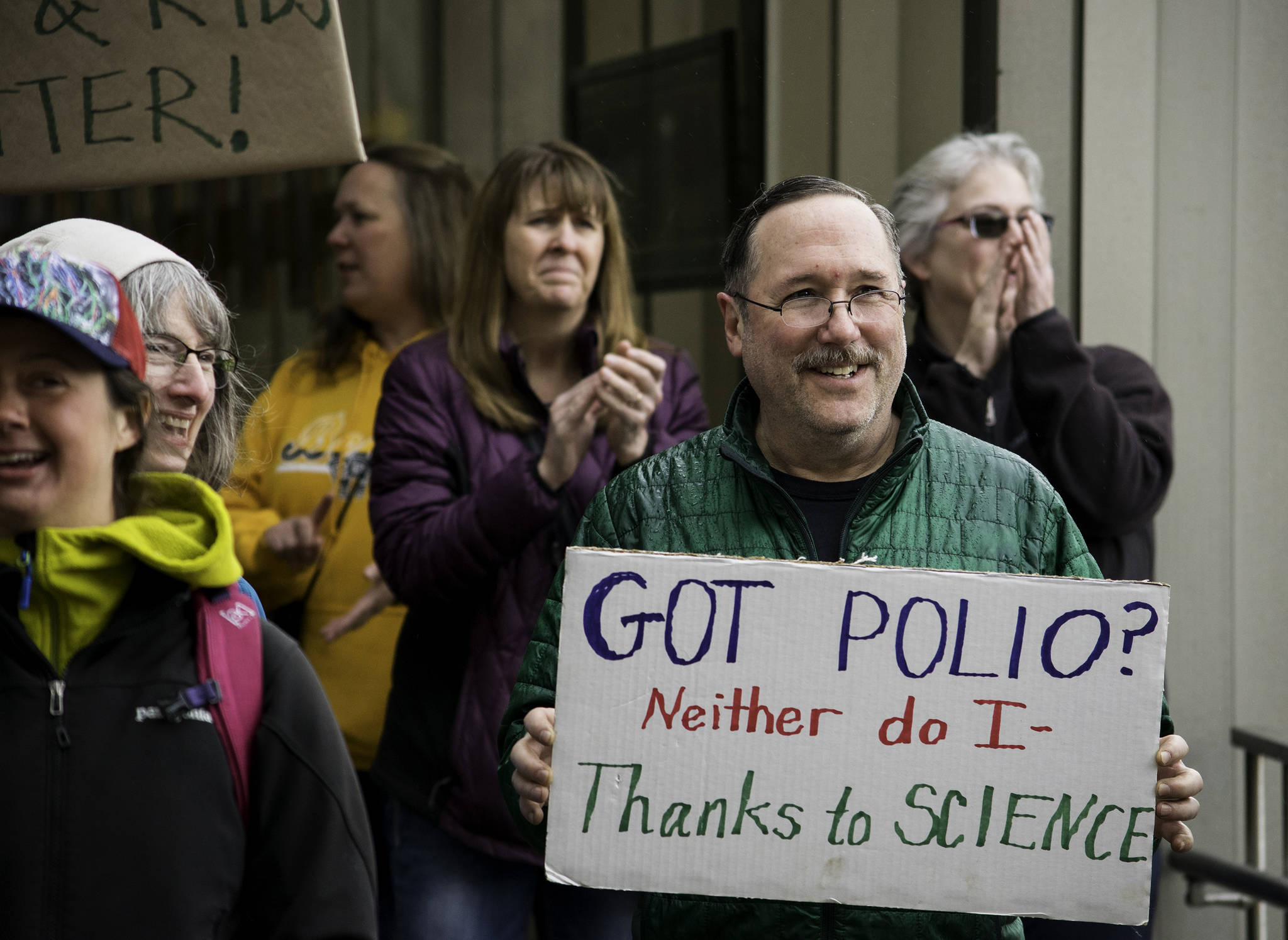A few hundred scientists, researchers, educators and students braved the rain to advocate for science and education at the second March For Science on Saturday.
Their message: evidenced-based decision making and science education need to be at the forefront of public life in America. Right now, it’s fallen by the wayside, many speakers said, partly due to a lack of scientific literacy in the American body politic.
In his remarks to the crowd, Juneau School District Board of Education president Brian Holst connected problems with education with the erosion of scientifically-informed public policy.
“Sixty percent of Juneau kids and 70 percent of Alaska kindergartners arrive not ready to learn. Too many of our K-12 students are not proficient in reading by the third grade. Half of Alaska high school graduates that enter the University of Alaska system have to take remedial classes and 75 percent of those never finish college,” Holst said.
Over the years, those gaps in knowledge accumulate, Holst went on, to produce an Alaska workforce that’s not prepared for the jobs the market provides.
“The Department of Labor estimates that by 2025, 65 percent of jobs in Alaska will require post-secondary education, but less than 50 percent of Alaskans have those credentials,” Holst said.
Many protestors expressed exasperation at a lack of climate change action and advocated for a move away from fossil fuels as a driver for Alaska’s economy.
Harborview Elementary School first-grade teacher and Division Leader for the National Science Teachers Association, Jennifer Tompson, said that if public schools foster critical thinking and scientific literacy, the future generation of leaders will be more apt to build a world based in fact.
“Science education is the value of a healthy democracy. We have to work together to ensure that all of our children, and especially the youngest students in our community, have a quality science education. Fully funding education means supporting children to think critical, to investigate, to discover and to question as they explore science, technology, engineering, the arts and mathematics,” Thompson said.
What policies might achieve Thompson’s and Holst’s goals? Holst advocated for the funding of pre-K programs, which studies have shown can help fill gaps in student achievement — and do so efficiently, Holst said.
“Alaska is one of the weakest investors in early education in the nation, even though we know that’s the highest return in our education dollars,” Holst said.
JSD has suffered budget cuts the last six years, he added, which should be reversed if we want to prepare students for a tech-based career, Holst argued. The cuts resulted in the loss of about 14 percent of JSD staff, about 100 staff, while losing just 4 percent in enrollment, Holst said.
Others lobbied the crowd to support an increase for the State of Alaska’s base student allocation, or BSA. House Bill 339, which is currently working its way through the Alaska Legislature, could increase the state’s per-student funding from $5930 to $6,030, or a total of $25.6 million. Breaking developments in the Legislature on Saturday made it clear that an increase in BSA is unlikely, however, as Empire reporter James Brooks writes in this print edition.
Outside of education funding, protesters expressed exasperation with public officials who deny the existence of human-caused climate change. Many are frustrated with a general lack of scientific literacy.
Courtney Pegus, an immigrant and Ph.D. candidate at the University of Alaska Fairbanks studying marine fisheries in Juneau, organized both this year and last year’s march. If America can put scientific ideals — objectivity, curiosity, fidelity to the truth — at the forefront, Pegus said, Americans might work together better as a nation, something sorely needed in the current political climat, Pegus said.
“What I love about science is, science doesn’t care if you believe in it or not. It doesn’t judge you, it doesn’t discriminate against you, it doesn’t matter about your ethnicity, race, immigrant status, gender, orientation or cultural background, anyone can do science,” Pegus said.
• Contact reporter Kevin Gullufsen at 523-2228 or kgullufsen@juneauempire.com. Follow him on Twitter at @KevinGullufsen.

